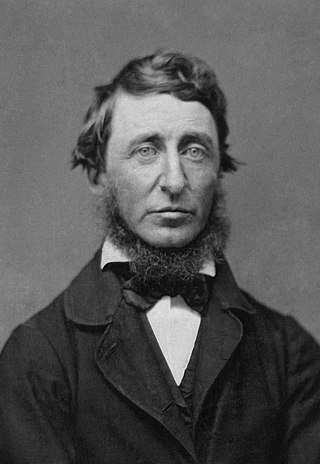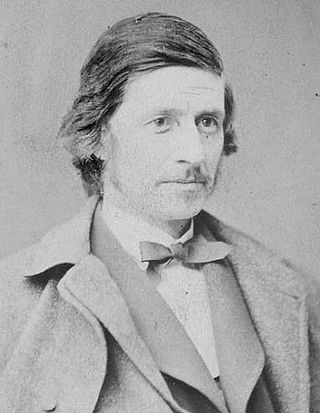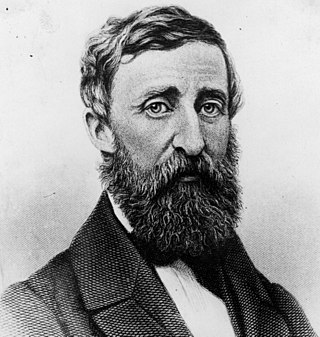
Ralph Waldo Emerson, who went by his middle name Waldo, was an American essayist, lecturer, philosopher, abolitionist, and poet who led the Transcendentalist movement of the mid-19th century. He was seen as a champion of individualism and critical thinking, as well as a prescient critic of the countervailing pressures of society and conformity. Friedrich Nietzsche considered him "the most gifted of the Americans", and Walt Whitman referred to him as his "master".

Henry David Thoreau was an American naturalist, essayist, poet, and philosopher. A leading transcendentalist, he is best known for his book Walden, a reflection upon simple living in natural surroundings, and his essay "Civil Disobedience", an argument in favor of citizen disobedience against an unjust state.

"A Plea for Captain John Brown" is an essay by Henry David Thoreau. It is based on a speech Thoreau first delivered to an audience at Concord, Massachusetts, on October 30, 1859, two weeks after John Brown's raid on Harpers Ferry, and repeated several times before Brown's execution on December 2, 1859. It was later published as a part of Echoes of Harper's Ferry in 1860.

Henry Shakespear Stephens Salt was an English writer and campaigner for social reform in the fields of prisons, schools, economic institutions, and the treatment of animals. He was a noted ethical vegetarian, anti-vivisectionist, socialist, and pacifist, and was well known as a literary critic, biographer, classical scholar and naturalist. It was Salt who first introduced Mohandas Gandhi to the influential works of Henry David Thoreau, and influenced Gandhi's study of vegetarianism. Salt is considered, by some, to be the "father of animal rights," having been one of the first writers to argue explicitly in favour of animal rights, rather than just improvements to animal welfare, in his Animals' Rights: Considered in Relation to Social Progress (1892).

Slavery in Massachusetts is an 1854 essay by Henry David Thoreau based on a speech he gave at an anti-slavery rally at Framingham, Massachusetts, on July 4, 1854, after the re-enslavement in Boston, Massachusetts of fugitive slave Anthony Burns.

Cultural liberalism is a social philosophy which expresses the social dimension of liberalism and advocates the freedom of individuals to choose whether to conform to cultural norms. In the words of Henry David Thoreau, it is often expressed as the right to "march to the beat of a different drummer". Also known as social liberalism in the United States, cultural progressivism is used in a substantially similar context, although it does not mean exactly the same as cultural liberalism.

Franklin Benjamin Sanborn was an American journalist, teacher, author, reformer, and abolitionist. Sanborn was a social scientist, and a memorialist of American transcendentalism who wrote early biographies of many of the movement's key figures. He founded the American Social Science Association, in 1865, "to treat wisely the great social problems of the day". He was a member of the so-called Secret Six, or "Committee of Six", which funded or helped obtain funding for John Brown's Raid on Harpers Ferry; in fact he introduced Brown to the others.

"Herald of Freedom" was an essay by Henry David Thoreau, published in The Dial in 1844, that praised Herald of Freedom, the journal of the New Hampshire Anti-Slavery Society, and its editor, Nathaniel P. Rogers. After Rogers died, Thoreau revised the essay and republished it.

The Service is an essay written in 1840 by Henry David Thoreau. He submitted it to The Dial for publication, but they declined to print it. It was not published until after Thoreau's death.

"Paradise Regained" is an essay written by Henry David Thoreau and published in 1843 in the United States Magazine and Democratic Review. It takes the form of a review of John Adolphus Etzler's book The Paradise within the Reach of all Men, without Labor, by Powers of Nature and Machinery: An Address to all intelligent men, in two parts, which had come out in a new edition the previous year. The essay amplifies such Thoreauvian themes as imploring people to self-betterment and a distrust of humanity's attempts to improve upon nature.

Sir Walter Raleigh is an essay by Henry David Thoreau that has been reconstructed from notes he wrote for an 1843 lecture and drafts of an article he was preparing for The Dial.

Wendell Phillips Before the Concord Lyceum is an essay style letter-to-the-editor written by Henry David Thoreau and published in The Liberator in 1845 that praised the abolitionist lecturer Wendell Phillips.

Reform and the Reformers is an essay written by Henry David Thoreau. The essay was never published in his lifetime, and has been cobbled together from existing lecture notes that Thoreau himself picked over for his other writings, such as Walden and A Week on the Concord and Merrimack Rivers.

"Thomas Carlyle and His Works" is an essay written by Henry David Thoreau that praises the writings of Thomas Carlyle.

Remarks After the Hanging of John Brown was a speech given by Henry David Thoreau on December 2, 1859, the day of John Brown's execution. Thoreau gave a few brief remarks of his own, read poetry by Sir Walter Raleigh, William Collins, Friedrich Schiller, William Wordsworth, Alfred Tennyson, George Chapman, and Henry Wotton, and then quoted from his own translation of Tacitus.

A Week on the Concord and Merrimack Rivers (1849) is a book by American writer Henry David Thoreau (1817–1862). It recounts his experience on a boat trip with his brother on the Concord River and Merrimack River.
Horace Mann Jr. was an American botanist, son of Horace Mann. His mother was one of the famous Peabody Sisters Mary Tyler Peabody Mann. Mentored in botany by Henry David Thoreau, whom he accompanied on an expedition to Minnesota, Mann took classes in zoology with Louis Agassiz and assisted William Tufts Brigham botanize the Hawaiian Islands. Mann was to have headed the botanical garden at Harvard, but died of tuberculosis at age twenty-four. His own herbarium was purchased by Cornell University and became the basis of that university's collection. He is credited with the discovery of more than 100 species.
Odell Shepard was an American professor, poet, and politician who was the 86th Lieutenant Governor of Connecticut from 1941 to 1943. He won a Pulitzer Prize in 1938.

Walking, or sometimes referred to as "The Wild", is a lecture by Henry David Thoreau first delivered at the Concord Lyceum on April 23, 1851. It was written between 1851 and 1860, but parts were extracted from his earlier journals. Thoreau read the piece a total of ten times, more than any other of his lectures. "Walking" was first published as an essay in the Atlantic Monthly after his death in 1862.
A Yankee in Canada, with Anti-Slavery and Reform Papers is an anthology of works by Henry David Thoreau, edited by his sister Sophia Thoreau and his friends William Ellery Channing and Ralph Waldo Emerson. It was published in 1866, after Thoreau’s death, by Ticknor and Fields, the Boston firm that had published Walden.








